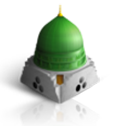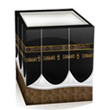Men's Facial Hair
- Details
- Category: Sheikh Albani
- Published on Monday, 28 October 2013 10:58
- Hits: 919
Is there a limit to growing facial hair, since some
people have very thick hair which sometimes goes from the
chest to the neck and even all the way to the eyes?
It is not permissible for the Muslim to remove any hair
from the beard except what the Lawgiver has allowed. It
is reported from one of the companions who narrated the
hadeeth, "Leave the beard and trim the moustaches,"
'Abdullaah bin 'Umar, that he used to remove from his
beard what was below a fistful. Apart from that, trimming
the beard is against the Sunnah, whether or not the man's
beard is pleasing to him, and whether or not it is
pleasing to others, for all of Allaah's creation is
handsome, as in the saheeh hadeeth, where the Prophet (S)
saw a man with a long waist-shirt and ordered him to have
his izaar halfway up his shins; the man gave the excuse
that he had a defect in his ankles, so the Prophet (S)
said, "All of Allaah's creation is handsome." (saheeh-
Ahmad and others. This phrase is actually of Qur'anic
origin cf. Sajdah 32:7)
Really we must memorize this hadeeth well in order to
answer the misconceptions in issues like this. One who
says that "my wife has a lot of hair and I do not want to
go near her" should remember this hadeeth, and in fact
remember the saying of Allaah:
"So set your face truly to the faith, Allaah's
handiwork according to the pattern on which
he has made mankind, (let there be) no change in
the creation of Allaah." (Roum 30:30)
Also the hadeeth
"Allaah has cursed the woman who tattoos and the
one who asks for it, the woman who plucks the
eyebrows and the one who asks for it and the
woman who makes gaps in her teeth, who change the
creation of Allaah for the sake of
beauty."(Bukhari, narrated by 'Abdullah bin
Mas'ood)
These few quotes are enough as proof to show that it is
not allowed to change the creation of Allaah in any way.
On top of this, there is the clear text about the shin;
so if the man who wants to cover the defect in his shin
were to say that there is a defect in my ankle, the
defect would be attributed to the Creator:
Glorified is He and High above all that they say,
Exalted and Great. (Israa' 17:43)
Similarly, the Prophet (S) said, "Do not abuse
Time, for Allaah is Time."
Allaah says:
Your Lord does create and choose as He pleases:
no choice have they. Glory be to Allaah! And far
is He above the partners they ascribe (to him)!
(Qasas 28:68)
According to His Wisdom, Allaah has differentiated
between men and women, created man with a beard and
created women without a beard; He did not do this without
reason. Also there are among men those with thick beards,
enough for an old wise man, others have light beards and
still others have almost no beards at all, just like
women.
Do you see any lack of proportion in the creation
of the Most Gracious? (Mulk 67:3)
Allaah be cleared of blame!
Hence, it is obligatory to accept the creation of Allaah.
Also, as I recently said for the benefit of some
brothers, although this will lengthen the discussion I
will nevertheless mention it: this man, who has been
mentioned in the question, whose beard reaches up to his
eyes, what is his Islamic obligation when he stands
before the mirror? A sincere believing Muslim, when he
looks at his figure in the mirror, says: "O Allaah! As
you have made my appearance beautiful, likewise make my
character beautiful (Allaahumma kamaa hassanta khalqee,
fa hassin khuluqee. This supplication is reported in a
hadeeth on looking in the mirror, but with a non-authentic
isnad. However, it is authentically related as a
supplication at any time. See Ibn Taymiyyah's al-Kalim at-
Tayyib with Albaani's footnotes). So, would this man say:
you have not made my appearance beautiful"?! This would
be Kufr itself.
Thus, it is obligatory on the believers to believe in
Allaah really and truly, and to implement this in their
lives, and to accept fully Allaah's creation just as they
accept His laws. Just as it is not allowed to violate His
laws, similarly it is not permissible to intentionally
oppose the practice of Allaah in His creation, and you
will never find change in the practice of Allaah. (cf.
Ahzaab 33:62)
); font-family: 'Times New Roman'; font-size: medium; text-align: start; background-color: rgb(255, 255, 204);">Is the hadith about wiping over the bandage authentic? If
not, what does a person with a bandage do (during
wudoo')?
The hadeeth of the bandage is not authentic, as far as I
know. As long as that is the case, the person follows the
commandments of Allaah as much as possible. Hence, if
someone has a bandage on a wound, he washes as many limbs
as possible which are required in wudoo'; apart from
that, he is excused, just as someone with an amputated
limb cannot wash all the required limbs. Allah does not
burden a soul beyond what it can bear. However, if the
hadeeth is authentic, then the bandage must be wiped.





















